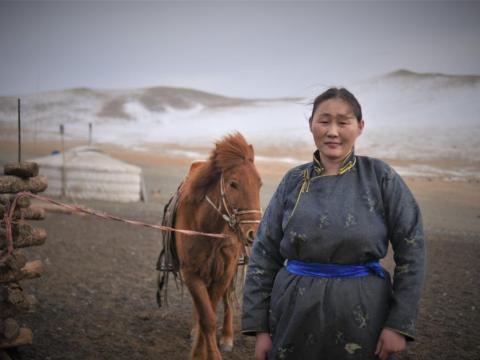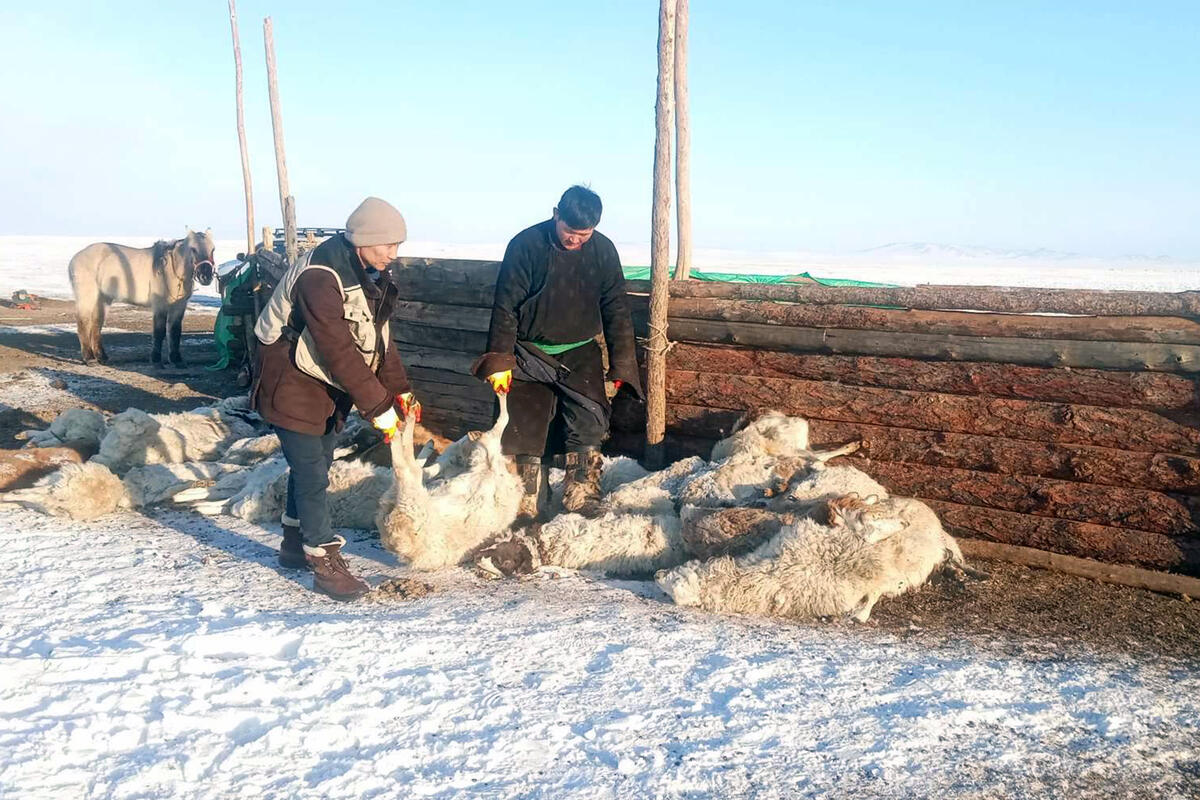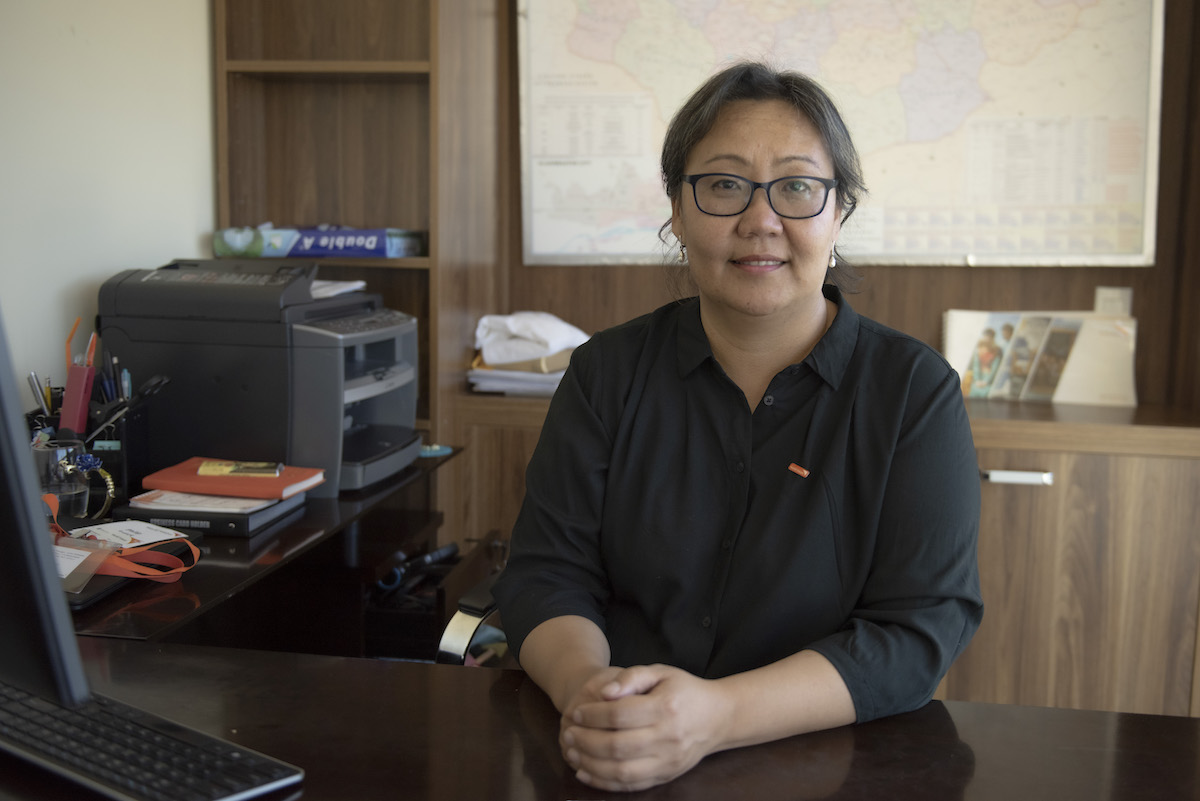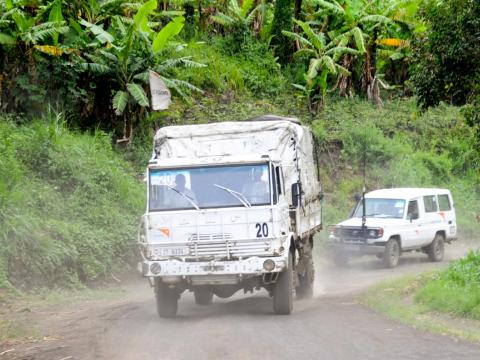
Anticipatory action brings hope to Mongolian children threatened by the climate crisis
National Director and meteorologist Bolortsetseg Bold warns that the climate crisis is increasingly putting Mongolian children at risk of food insecurity and family separation, but there is hope in Anticipatory Action.
When I went to the field with our World Vision Mongolia team back in January, I knew there would be challenges like having to brave –40C temperatures, seeing families and livestock struggle with the cold, and as a result, becoming food insecure, but it still broke my heart seeing a climate crisis unfold before my eyes and seeing that it is, in fact, a direct link to the food insecurity in Mongolia.
As one of the most vulnerable regions to the impacts of climate change, East Asia and the Pacific1 has witnessed more intense and frequent natural disasters like cyclones, earthquakes and drought in recent years. But in Mongolia, a phenomenon called ‘Dzud’, is becoming a bigger issue by the day. It’s a climate crisis caused by summer drought followed by heavy snowfall and extreme cold, rendering hundreds of thousands of livestock dead and threatening the livelihoods of at least 30% of Mongolia’s population.

Dzud used to happen once or twice a decade, but due to rapid climate change, and destructive human behaviors such as livestock overgrazing, it has become much more frequent. Reports show that climate change has increased the frequency and duration of summer droughts by nearly a third since the year 2000, while also contributing to more heavy and continuous snowfall in winter months.
Like any disaster in the region, Dzud affects children disproportionately and children are faced with multiple challenges like rising inequity. When pasture is unavailable, herders’ resort to Otor, or transhumance migration, causing household separation. Children either stay with relatives or in dormitories while their parents find ways to keep their livestock alive.

The death of livestock also means loss of income and leads to food insecurity for entire families. The most vulnerable are further pushed into the endless cycle of poverty. On the surface, the problem seems insurmountable, but what I have come to clearly see is the possibility of protecting our decades of development gains through Anticipatory Action.
Anticipatory Action is an initiative World Vision Mongolia is embracing which uses meteorological early warning data to better predict weather patterns in order to more effectively prepare for, and mitigate the impact of climate hazards. As a meteorologist, I have spent years studying and predicting weather and climate, including its impact on humans. Now, as humanitarian worker, I’m seeing the impact unfold right in front of me, especially in the uncertain futures of the children I hope to protect.
Several studies have already shown the valuable impact of Anticipatory Action. A report highlighted that for every dollar spent in early action, the return of investment is $72. In a separate impact assessment report published by Start Network alongside World Vision and Save the Children, it was found that the reactive intervention cost, inclusive of all logistics and monitoring activities, was $120 per household, while in contrast, the cost of a sheep at that time was about $60 proving that the savings was greater than the cost when anticipatory actions are implemented.
Cash programming plays a significant role in the success of World Vision’s Dzud response. We have seen and heard it from the families we work with. By putting cash directly in the hands of herders before the Dzud peaks, it gives them the control and flexibility to use the funding in a way that is best suited to the needs of their individual families and gives them the power to determine how best to protect livestock so that food insecurity is avoided.

Dzud is a crisis that can be predicted like cyclones, eruptions, floods and more. In order to have Anticipatory Action truly make a difference in the lives of Mongolia’s and even the world’s most vulnerable, there has to be a bigger commitment to the process. More humanitarian agencies, including institutional donors need to get on board and the government must prioritize its implementation and invest on improving early warning systems.
Going back to that freezing January day, I am grateful for what I learned about Dzud and the perspective it gave me. Clearly, there has never been a more critical time to take action on the Dzud crisis and all other predictable disasters in order to protect the lives of the most vulnerable children and families in Mongolia.
World Vision Mongolia is responding to the needs of the most vulnerable families affected by Dzud. To date, the response, which started with the Anticipatory Action phase aimed at mitigating the impact of Dzud, has reached over 16,000 people, including over 8600 children through multi-sector intervention that includes distribution of food, child kit, fodder and hay and multi-purpose cash. To read morea bout World Vision's Dzud anticipatory response providing aid to affected herder families in Mongolia click here, to read about women's inclusion in World Vision's Dzud anticipatory action initiatives click here.

Bolortsetseg Bold is the National Director of World Vision Mongolia. She has 18 years of World Vision experience and held various leadership positions in Humanitarian and Emergency Affairs, Field Programming, Design, Monitoring and Evaluation (DME), Grant Acquisition and Strategy Management. Bolortsetseg has a Master’s Degree in Applied Meteorology from Mongolian State University; and in Organisational leadership and development from Eastern University, Pennsylvania, USA.
Main Image: Bayartsetseg, 29, is one of the women who participated in the review and development of World Vision Mongolia’s Anticipatory Action protocols for Dzud. Credit: Altankhuyag Otgonsuren, World Vision


